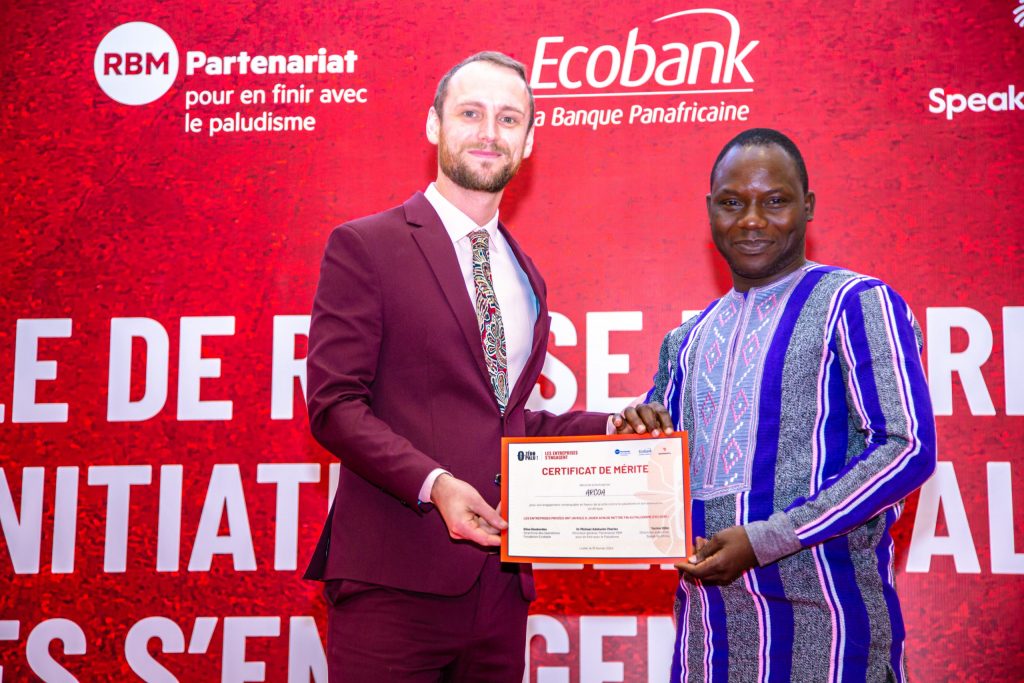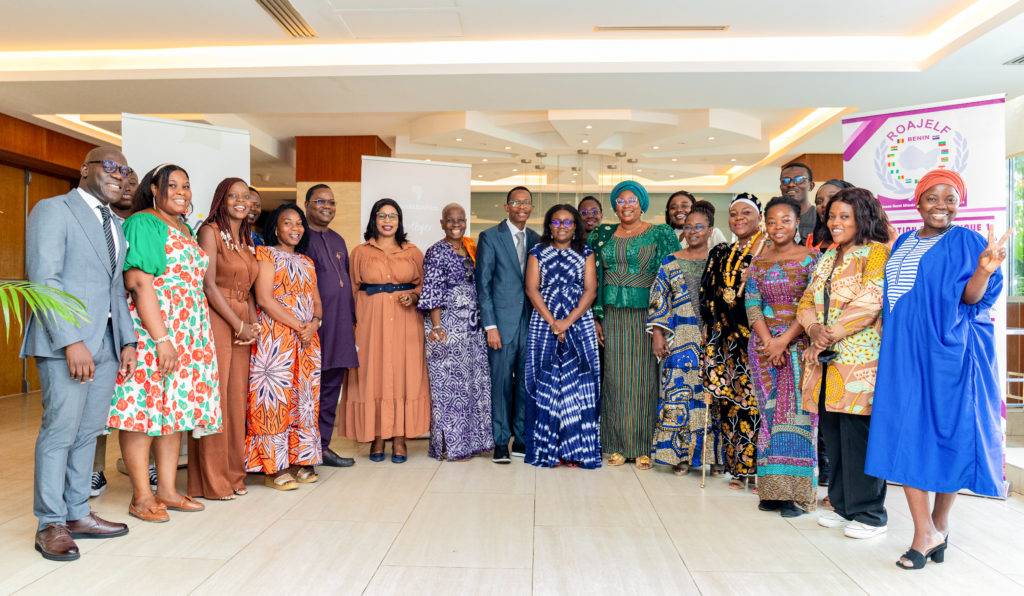Why private sector mobilization is essential for malaria control and elimination: Reflecting on the Zero Malaria Business Leadership Initiative


By James Wallen, Speak Up Africa’s Malaria Coordinator – Mars 2024
International funding for malaria is stagnating: we are currently seeing a $1.5 billion budget shortfall just to sustain basic malaria services, with $5.2 billion in additional investment required annually to make progress towards elimination. The importance of the role of the private sector – a largely untapped resource when it comes to malaria – in supporting government-led efforts to end malaria is thus becoming ever clearer.
The need to meet this challenge face-on is why Speak Up Africa decided to partner with Ecobank and the RBM Partnership to End Malaria on the Zero Malaria Business Leadership Initiative over the last 4 years.
In Lomé on the 15th February, we were honored to celebrate the companies and business leaders who have made this initiative a success, collectively mobilizing $6 million in in-kind and financial contributions across Benin, Burkina Faso, Ghana, Senegal and Uganda.
It was an exceptional moment of shared celebration and gratitude for all those who have come together around a powerful collective vision. Of the 60 companies who have contributed over the last 4 years, 9 were selected to receive awards: from Benin, MTN and Polyclinique St Vincent de Paul, from Burkina Faso, Univers Bio Medical and Iris Conception Trade, from Ghana, Multi-media Group, from Sénégal, Canal+ and I-CONS and from Uganda, Next Media and Rimka.
In addition, 3 champions – individual business leaders prepared to leverage their influence within their networks to drive advocacy and resource mobilization efforts – received awards: Kenneth Wycliff Mugisha, Malaria-Free Uganda Board Chair and life-long businessman, Samuel Asiedu Agyei, Director of the AngloGold Ashanti Malaria Program in Ghana, and the Honorable Ake Natondé, Member of Parliament in Benin and Promoter of the Haute Ecole de Commerce et Management.
The Zero Malaria Business Leadership Initiative is doing its part to strengthen the groundswell of support for malaria elimination among the African private sector, which is itself significantly harmed through weakened macro-economic conditions, reductions in disposable income, increased healthcare costs, higher absenteeism, and lower productivity.
Let’s take a moment to consider some of alarming statistics that illustrate the extent of this impact:
- A person suffering from malaria usually loses between 1.5 and 4 days of work per episode.
- In Kenya alone, around 170 million working days and 11% of primary school days are lost every year due to malaria.
- Malaria is estimated to impair as much as 60% of the schoolchildren’s learning ability.
- Malaria-related absenteeism and the resulting loss of productivity costs Nigeria almost $1.1 billion a year.
- In sub-Saharan Africa, 72% of companies report a negative impact resulting from malaria, with 39% perceiving these impacts to be serious.
- The total direct and indirect cost of malaria can be as much as 32% of annual household income in families with a very low income.
- Malaria reduces GDP growth by up to 1.3% in malaria endemic countries.
- In Ghana, the economic gain from eliminating malaria by 2030 is estimated at $32 billion in terms of reduced health system expenditure, increased household financial resources and productivity gains.
Of course, the impact is not felt evenly across or within countries – some areas within a country are far more severely impacted than others. A case in point is in Senegal, where around 80% of the country’s malaria-burden is located in the south-east of the country, whereas some areas in the north are on the cusp of localized malaria-elimination. Private sector companies will be more directly impacted if their operations are in high-burden areas, and especially so if they require a large number of manual laborers who are particularly exposed to malaria transmission.
However, as we can see from the above statistics, the impact of malaria is profound and extends beyond a localized analysis: it has a major impact on educational attainment, thereby weakening the employment market; it drains families incomes, so less can be spent on goods and services provided by the private sector; it puts huge pressure on the public health system and government spending, investment which is direly needed elsewhere, and the effects are even seen at the macro-economic level when looking at economic performance indicators such as GDP. The contrast here is stark: while malaria continues to be minimized and normalized by many, the impact on individuals, families, communities, companies, entire nations and the African continent as a whole cannot be overstated, and, conversely, the potential economic benefits of malaria elimination would be dramatic, long-term and cumulative[2].
The African private sector therefore has an acute interest in being a part of the solution. Which takes us back to the Zero Malaria Business Leadership Initiative: companies of widely varying sizes and representing a vast array of economic sectors, such as telecoms, construction, mining, pharmaceuticals, banking, micro-finance, and many others, have found ways to meaningfully contribute.
Some of the ways in which companies have contributed through this initiative include: donating malaria control tools such as mosquito nets or rapid diagnostic tests to fill specific gaps identified by national programs; providing free air time and sending millions of text messages to amplify key messages related to malaria prevention and treatment; training community health workers on malaria control best practices and providing bicycles and motorbikes to improve accessibility to remote areas; implementing malaria control interventions in specific geographic areas including indoor residual spraying (IRS), providing anti-malarial medications to avoid stockouts in priority districts, and conducting community sensitization; and supporting logistics during mass distribution campaigns, to name but a few examples.
While we celebrate the successes of this pilot initiative, as well as learn from what worked and what didn’t with a view to improving private sector engagement strategies moving forward, we must also be realistic regarding the serious challenges facing the global malaria control community.
Indeed, the risks to further progress against malaria are clear and alarming: insecticide, drug and diagnostic resistance, climate change, and the spread of the invasive Anopheles Stephansi mosquito all threaten to undermine the huge progress made since the turn of century. New tools are in the pipeline but without serious cross-sectoral commitment and innovative financing mechanisms, they will prove difficult to scale, not to mention the existing challenges related to ensuring baseline coverage of essential existing malaria control interventions. Let’s remember that, according to the latest World Malaria Report, in 2022 almost half of pregnant women (42%) did not receive the recommended 3 doses of intermittent preventive treatment (IPTp), and around one-third of febrile children were not taken to a health provider for care.

Effectively combating malaria, and standing a chance of being the generation to see its elimination, will require a monumental response uniting governments, development partners, the private sector, civil society and the media, traditional and religious leaders, sports personalities and celebrities,
academic and research institutions, innovators and entrepreneurs.
Everyone has a role to play.
#ZeroMalariaBusinessLeadershipInitiative
#ZeroMalariaStartsWithMe
[1] The government in Benin has also confirmed an additional 22% budget increase for malaria control in 2024
[2] Some estimates place the economic benefit of malaria elimination at $4 trillion. https://endmalaria.org/sites/default/files/RBM_AIM_Advocacy_pull-out_EN-lores_0.pdf


